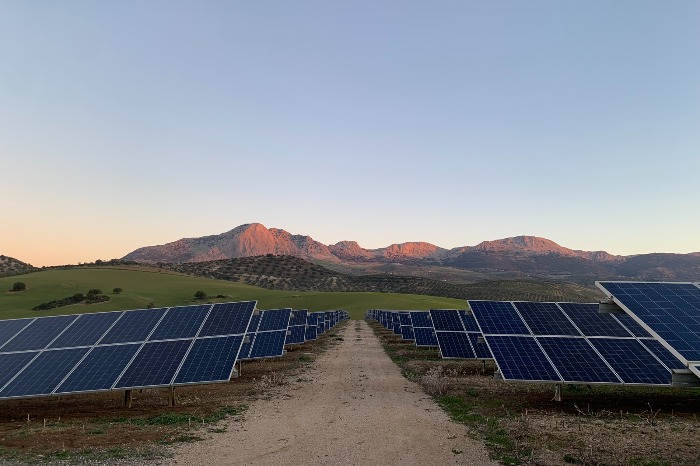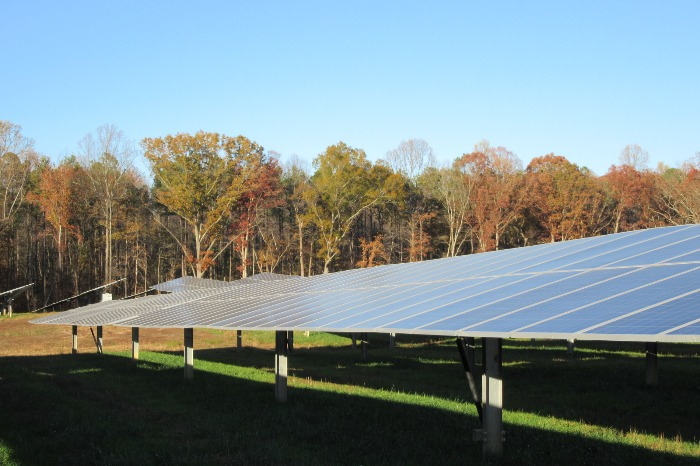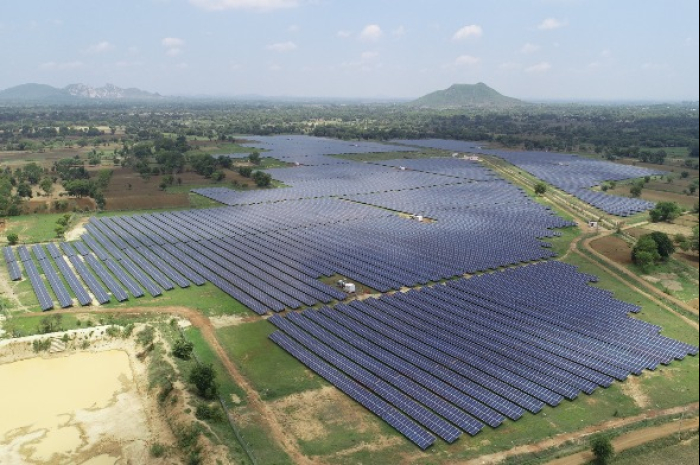Energy
What drives opportunity in solar power: NextEnergy Capital
NextEnergy Capital explains why Korean investors should be investing with a specialist solar fund manager
Feb 14, 2024 (Gmt+09:00)
7
Min read
Most Read
LG Chem to sell water filter business to Glenwood PE for $692 million


Kyobo Life poised to buy Japan’s SBI Group-owned savings bank


KT&G eyes overseas M&A after rejecting activist fund's offer


StockX in merger talks with Naver’s online reseller Kream


Mirae Asset to be named Korea Post’s core real estate fund operator



NextEnergy Capital, a leading global fund manager specializing in ground-mounted solar energy, will boost its investments in renewables around the world this year. Michael Bonte-Friedheim, founding partner and group CEO, explains the firm’s assets and shares his views on the enormous potential in the solar power sector.
What is NextEnergy Capital?
“To date, NextEnergy Capital has acquired over 400 assets with more than 3 gigawatt (GW) capacity installed worldwide, with 21 assets currently under construction worldwide with a pipeline of over 16GW.
NextEnergy Capital is the leading specialist international investment and asset manager focused on the solar infrastructure sector. The company has about 300 employees across multiple offices, including in London, Milan, Hyderabad, Madrid, New York, Luxembourg and Guernsey. Its activities span investment management, operating asset management and asset development across the main solar markets globally.
Since inception, we have acquired some 400 utility-scale solar assets and currently manage about $4 billion dedicated to the solar infrastructure sector across listed and private institutional investment funds. The installed capacity across the group’s institutional investment vehicles exceeds 2.4 gigawatt-peak (GWp).”

Can you explain NextEnergy Capital’s fund strategies in greater detail?
“NextEnergy Capital manages five solar funds, each with its unique strategy and return profile; four private funds; and one listed fund.
The listed fund is NextEnergy Solar Fund (NESF), which trades on the premium segment of the London Stock Exchange and is a constituent of the FTSE250 index.
The four private funds are NextPower II (NPII), which is now divested, resulting in a gross internal rate of return (IRR) of 30.2% versus a gross IRR target of 10-12%; NextPower III ESG (NPIII ESG), which is now fully invested; and the two most recent funds, Fund Four: NextPower UK ESG (NPUK ESG) and Fund Five: NextPower V ESG (NPV ESG), which are open to investors.
NPUK ESG focuses on new build solar PV across the UK. Since its first close 12 months ago, the fund has raised £600 million in commitments, acquired 10 utility-scale solar assets for a total capacity of 500 MW, and distributed a 10% net dividend to investors.
NPUK ESG was backed by government-backed UK Infrastructure Bank, which acted as the cornerstone investor, committing £250 million ($314.1 million) on a match-funding basis. This marked the first private fund investment for the bank and not only provided meaningful funding to help the UK government meet its net zero goals but was also a significant endorsement of the NextEnergy Capital platform by the UK government.
NPV ESG is a follow-on fund from its predecessor NPIII ESG, both of which pursue the same international solar PV strategy across carefully selected OECD markets.
Recently, NPV ESG announced its maiden acquisition of a 100 MW solar asset in the US state of Florida. This investment follows the NPV ESG’s successful first close of $480 million of capital in July 2023.
NPV ESG utilizes NextEnergy Capital’s in-house expertise and leverages NPIII ESG’s proven international track record, which to date has acquired a portfolio of over 1.9 GW capacity with 173 assets across the US, India, Chile, Italy, Portugal, Spain, Greece and Poland.”

Why invest in solar?
“Solar energy is the most abundant form of energy on Earth. In a single hour, the amount of power from the sun that strikes the Earth is more [energy] than the entire world consumes in a year. Solar is a reliable and simple technology with no moving parts. It is also one of the cheapest and fastest forms of renewable energy to construct.
The irradiation levels emitted from the sun are highly predictable, with minimal variation over the long term. Solar PV modules are a well-established technology with a simple, de-risked construction process when managed by a sector expert such as NextEnergy Capital.
This allows for an attractive investment underwriting case when paired with a long-term power purchase agreement, creating long-term certainty and visibility for the sale of electricity from the solar asset while providing stable cash flows.
The investment opportunity for solar is further driven by the global push for net zero, the need for energy security, energy sustainability, energy affordability and local political targets to decarbonize.
With global governments committing to Net Zero by 2050, large volumes of capital are required to meet these goals. It is expected that in Europe alone over $900 billion needs to be invested into solar energy by 2050.”
How does a specialist add value?
“Institutional investors currently face a wide range of issues when it comes to selecting their fund managers, regardless of the asset class.
The idea of investing with a specialist manager who has genuine expertise is a well-understood investment thesis in the institutional investment world. At NextEnergy Capital, we believe that specializing provides investors with unique access to a wealth of experience that is not achievable by a generalist manager.
We believe that by backing a specialist manager in the solar space, investors can still benefit from portfolio diversification while achieving attractive returns, but most important, put their capital to work to directly combat the effects of climate change.
However, investing in private markets such as renewable energy requires a deep understanding and management of the various operational, technical, and regulatory issues that exist in all sectors.
A specialist manager can build and develop teams and strategies to meet these challenges and turn them into opportunities for investors. When combined with an impressive track record, specialization demonstrates that this approach can lead to better investment performance and returns for investors.”

What does NextEnergy Capital’s track record look like?
“NextEnergy Capital has over 16 years of experience in the sector, where we have outperformed the sector as a whole following the disposal of assets in its funds.
As an example, the exit from NPII in January 2022 resulted in a gross IRR of 30.2% versus a gross IRR target of 10% to 12%.
The performance of this fund, and the continued trend in more recent fund vintages, has been driven by a dedicated focus on purely solar assets and a proprietary pipeline that enables the swift deployment of investor capital into the very best assets through a tried and tested investment process.”
Why is ESG so important to NextEnergy Capital?
“An understanding of ESG is crucial to developing strong relationships with institutional investors, who are coming under increasing pressure from regulators and their other stakeholders to ensure that investments are sustainable.
ESG is at the forefront of everything we do at NextEnergy Capital. This is driven by NextEnergy Capital’s mission to generate a more sustainable future by leading the transition to clean energy. This mission has guided the development of a sustainability framework that is founded on three pillars: biodiversity, climate change and human rights. This framework also aligns with the UN Sustainable Development Goal.
The solar power sector naturally incorporates many elements of ESG but we still have a dedicated, independent ESG team with diverse industry expertise to allow for these themes to be fully integrated at every step of the investment process.
In addition, all NextEnergy Capital funds are classified as EU SFDR Article 9 and therefore have sustainable investing as a core investment objective. All of this results in an ESG function that can expertly and accurately assess the impact of investment and asset management practices on solar assets with complete confidence.
Furthermore, solar farms provide the perfect opportunity to design and implement bespoke and effective measures that restore, repair and connect local wildlife, habitats, and ecosystems. Each of NextEnergy Capital’s solar assets also undergoes detailed ESG mapping to analyze where we can drive impact.”

Michael Bonte-Friedheim founded NextEnergy Group in 2006. NextEnergy Group operates through its three business units: NextEnergy Capital (investment management), WiseEnergy (operating asset management), and Starlight (asset development). Michael has over 30 years of experience in the renewables and energy sector, banking and finance industries.
He was formerly a Managing Director at Goldman Sachs in the Energy and Power Investment Banking Group. He parted in 2006 to found NextEnergy.
Jihyun Kim edited this article.
More to Read
-

-
 EnergyOCI signs $1 billion polysilicon supply deal with US solar firm CubicPV
EnergyOCI signs $1 billion polysilicon supply deal with US solar firm CubicPVDec 19, 2023 (Gmt+09:00)
3 Min read -
 EnergyKOWEPO inks $302 mn financing deal for Oman solar project
EnergyKOWEPO inks $302 mn financing deal for Oman solar projectDec 07, 2023 (Gmt+09:00)
1 Min read -
 Alternative investmentsClean energy remains top pick for Korean infrastructure investors
Alternative investmentsClean energy remains top pick for Korean infrastructure investorsApr 28, 2023 (Gmt+09:00)
4 Min read -
 Korean InvestorsRenewables emerge as LPs' top infrastructure sector
Korean InvestorsRenewables emerge as LPs' top infrastructure sectorMay 03, 2022 (Gmt+09:00)
3 Min read
Comment 0
LOG IN


